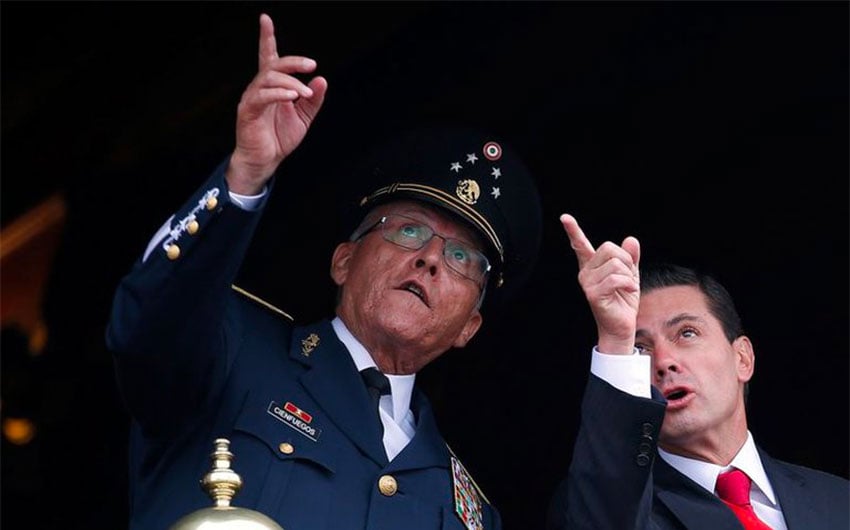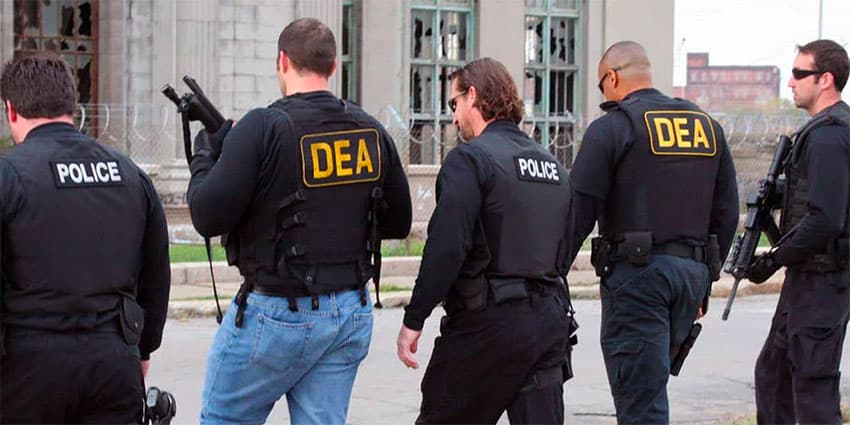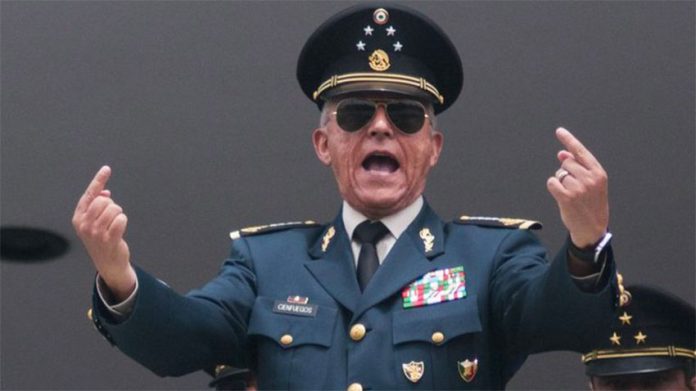The United States Department of Justice (DOJ) has rejected President López Obrador’s claim that the drug trafficking case against former defense minister Salvador Cienfuegos was fabricated and accused the Mexican government of violating a bilateral treaty by releasing U.S. evidence against the retired army general.
The federal Attorney General’s Office (FGR) announced Thursday that it had exonerated Cienfuegos, defense minister between 2012 and 2018, of drug trafficking and money laundering charges less than two months after he returned to Mexico from the United States. He was arrested in Los Angeles last October but under pressure from Mexico the U.S. dropped the case against him and allowed Cienfuegos to return home to be investigated here.
López Obrador claimed Friday that the United States Drug Enforcement Administration (DEA) fabricated accusations against the ex-army chief, who the U.S. alleged had conspired with the H-2 Cartel to smuggle thousands of kilograms of drugs into the United States.
In a statement sent to the Associated Press after the federal government released a 751-page file the FGR received from United States authorities, the DOJ said it was “deeply disappointed by Mexico’s decision to close its investigation” into Cienfuegos.
“The United States Department of Justice fully stands by its investigation and charges in this matter. … The materials released by Mexico today show that the case against General Cienfuegos was, in fact, not fabricated,” it said.
“Those materials also show that the information relied upon to charge General Cienfuegos was lawfully gathered in the United States, pursuant to a proper U.S. court order, and in full respect of Mexico’s sovereignty.”
The DOJ said it could reopen its case against the former army chief. It also said it was disappointed by Mexico’s decision to publicize information it shared “in confidence.”
(Intercepted text messages contained in the U.S. file were marked: “Shared per court order, not for further distribution.”)
“Publicizing such information violates the Treaty on Mutual Legal Assistance between Mexico and the United States, and calls into question whether the United States can continue to share information to support Mexico’s own criminal investigations,” the DOJ said.
The file released by the Ministry of Foreign Affairs (SRE) on Friday includes intercepted text messages between Daniel Silva Gárate, a leader of the Nayarit-based H-2 Cartel known as “El H9,” and his boss and uncle, Juan Francisco Patrón Sánchez, the cartel’s now-deceased chief who was known as “El H2.”
The former, who is also no longer alive, allegedly acted as a cartel intermediary with Cienfuegos.

In one message, Silva told Patrón that he had been picked up by a group of men with military-style haircuts and taken to Defense Ministry headquarters in Mexico City for a meeting with “The Godfather,” which was apparently Cienfuegos’ nickname among his alleged criminal conspirators.
Silva told his uncle that The Godfather told him, “Now we are going to do big things with you … that what you have done is small-time.”
Patrón responded that he wanted unobstructed routes to ship drugs from Colombia. Silva texted back: “He [Cienfuegos] says that as long as he is here, you will be free … that they will never carry out strong operations” against the H-2 Cartel.
Silva also told Patrón that The Godfather had told him: “You can sleep peacefully, no operation will touch you.”
According to the Associated Press, other exchanges intercepted by the DEA describe The Godfather purportedly offering to arrange a boat to help transport drugs, introducing the traffickers to other officials and acknowledging helping other traffickers in the past.
The FGR dismissed the incriminating messages, saying in a statement Thursday: “The conclusion was reached that General Salvador Cienfuegos never had any meeting with the criminal organization investigated by American authorities, and that he also never had any communication with them, nor did he carry out acts to protect or help those individuals.”
According to a report by the newspaper El Universal, the FGR concluded that Silva deceived his uncle, making him believe that he had met with Cienfuegos when in fact he had not. His objective in doing so, according to FGR sources, was to obtain money from Patrón under the pretext that he needed to pay a bribe to Cienfuegos.
In the U.S. file published by the SRE, the DOJ said that Cienfuegos was never the main target of the DEA. It said the anti-drugs agency discovered information that incriminated the former defense minister while carrying out an investigation into heroin dealers in Las Vegas, Nevada, who apparently received shipments of the drug from the H-2 Cartel.
The FGR’s exoneration of Cienfuegos adds to a crisis in security cooperation between Mexico and the United States less than a week before Joe Biden is sworn in as U.S. president.
Even though the U.S. yielded to Mexico’s pressure and sent the former defense minister home, Mexico last month approved legislation that regulates the activities of foreign agents in Mexico, removes their diplomatic immunity and allows for their expulsion from the country. That legislation, described by the Associated Press as a “slap in the [United States’] face,” went into force Friday.
In addition, United States Ambassador to Mexico Christopher Landau revealed this week that Mexico rejected U.S. offers to help control cross-border arms trafficking.
The decision to clear Cienfuegos of the drug trafficking allegations after such a short investigation – and after Foreign Minister Marcelo Ebrard said that to bring the former defense minister home and then do nothing would be “almost suicidal” – amounts to a betrayal of the confidence the United States apparently showed in Mexico’s capacity to hold him to account.

Gladys McCormick, an associate professor in history at Syracuse University’s Maxwell School of Citizenship and Public Affairs, told the Associated Press that it wasn’t surprising that Cienfuegos was exonerated but added:
“One would think that they would have at least followed through on some semblance of an investigation, even if it was just to put some window dressing on the illusion that the rule of law exists. From the Mexican side, this signals the deep-seated control the military as an institution has on power.”
Three analysts who spoke to El Universal said the rapid exoneration of Cienfuegos creates more doubt than certainty about his innocence, and poses a threat to the relationship with the United States. The latter view is supported by the DOJ’s indication that the United States could stop sharing intelligence with Mexico.
César Gutiérrez Priego, a lawyer who specializes in military matters, said the exoneration raises questions because it came so quickly. The FGR normally acts very slowly, he said.
Gutiérrez said it was regrettable that the FGR hasn’t been transparent in its management of the case and charged that the accusations against Cienfuegos will damage the army’s reputation even though the former defense minister has been cleared of wrongdoing.
Raúl Benítez Manaut, a security expert and professor at the National Autonomous University, said it was hard to believe that the FGR had carried out a thorough investigation in such a short period of time.
“We’ll have to congratulate Attorney General Alejandro Gertz Manero because it’s the first time that the FGR has completed an investigation so quickly,” he said sarcastically. “It’s the fastest investigation in the history of the Mexican legal system and that causes a lot of suspicion.”
Benítez criticized López Obrador for speaking about the case, saying that he should leave the matter to the FGR, which is supposedly completely autonomous of the federal government.
He said it was possible that the United States will reopen its case against the former defense minister and seek his extradition in light of his exoneration in Mexico.
“This could lead to a strong conflict between the two countries,” Benítez said.
Source: AP (en), El Universal (sp)
